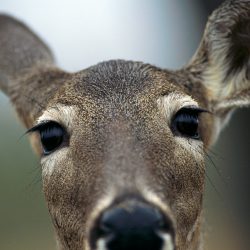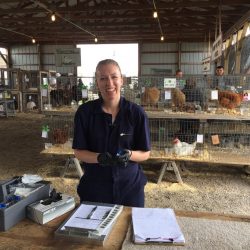By Melanie Graham

Food animal veterinarians and small animal veterinarians have many similarities; they both are responsible for ensuring that animals receive adequate care to maintain their health. They also are an important resource for animal owners in search of guidance on how to care for their animals. All veterinarians, despite their species of interest, are responsible for serving both the animal patient and the animal owner.
But, where food animal veterinarians differ is that they also are responsible for serving an individual they have never met and likely never will meet. The consumer— person purchasing and consuming the animal or animal product that the veterinarian is treating. The responsibility of looking after the health of the consumer is a duty that all food animal veterinarians take very seriously. This concern for the consumer manifests in many ways including checking drug withholds on administered medications. This ensures that there are no antibiotics or other drug residues in the meat or milk that is put on the shelf in the grocery store.
When a food animal is treated for any type of illness, the person treating that animal becomes responsible for ensuring that the animal not only receives appropriate and adequate care, but also for ensuring that the animal is still safe for public consumption. All drugs labeled for food animal use have listed withhold dates on the label that state when the animal’s meat or milk (or eggs) will be safe to enter the food chain. There is never a time when a veterinarian will look past a withhold date because they know that doing this will not only mean a major loss for their client and their reputation, but that human health could be at risk.
Unfortunately, there are also times when no drug treatment options are available for the animal. The veterinarian then has to decide if the animal can still be consumed. Any food animal veterinarian that has to determine the best end of life option for a sick animal asks him or herself, “Would I want to feed this animal to my family?” If the answer is “yes,” they can advise their client that the animal is safe to put on a truck for slaughter. But if the answer is “no,” they may elect to euthanize the animal. The decision to euthanize an animal often comes at a loss for the client, but it is a loss that both the veterinarian and the owner are willing to make, as it ensures the public remains safe.
The food animal veterinarian is crucial in ensuring that ALL food is safe, whether it is coming from conventional farms or organic farms, and that all animals are being well cared for and all drug withhold times are being properly met. Sometimes, it seems that food animal veterinarians have the weight of the world on their shoulders as they balance animal care and health with client demands and consumer safety. But, it is a weight that food animal veterinarians gladly carry because it allows them to know that not only are animals well cared for, but also that all food animal products are safe.



